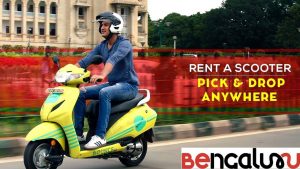
Bengaluru is the world’s scooter-sharing capital, shows a report by German e-scooter maker Unu. Thanks to mobility startups Bounce and Ola-backed Vogo, the city accounts for over 15,000 of India’s 20,000-odd scooters – much ahead of Madrid and Paris. The two desi ventures together clock over 100,000 rides a day even as cab-aggregators Uber and Ola eye the space. What’s driving the adoption of dockless scooters? They are cheaper than cabs and better at navigating jams. But safety is an issue: Research shows that 98 in 100 lives lost on Bengaluru roads are of pedestrians or two-wheeler riders.
Growth in vehicle ownership and demand for transportation is leading to higher congestion in urban centers, higher vehicular emission rates, with negative implications on human health and the environment. India has an opportunity to redefine personal mobility and pave path for the shared mobility market in India. Currently with more than 15,000 fleets, India’s IT Capital Bengaluru is the new scooter sharing capital of the world. Beating more than two times against next two global cities combined – Madrid and Paris in the world. Bengaluru standalone contributes for up to 75% of the Indian fleet (20000), which is the highest in the world followed by Spain (13520) and France (8200).
Super exciting to see how scooter sharing has picked up in the city in the last one year. The fact that scooters can now be seamlessly picked up in less than a minute, driven and dropped off for as short as a 1 km or for a couple of minutes is changing how masses move from A to B. At present Vogo Automotive Pvt. Ltd. and Bounce are two leading players the Indian race dominating with almost 70% of the market share.
But the stark difference is the usage of electric scooters over the world compared to the petrol fleet here in India, which is slowly changing with new players like Fae Bikes entering the market. My hometown in India is considered the Start-up heaven of the country. They prove this time and again with their ability to adapt and accept new ideas. Two-wheeler ride sharing might play a huge role in reducing vehicular volume on Bangalore roads. Why take your scooter 10 miles across town, when you could hop on one half-way?
Shared mobility market has seen significant traction from strategic/financial investors in the recent past. Hyundai invested $300 Mn in Ola; Ola invested $100 Mn in Vogo, scooter sharing company in India; Mahindra launched electric ride sharing service called Glyd; Sequoia, Lightspeed, Amazon invested US$ 30 Mn in Shuttl, market leader in app based bus sharing specifically for employee transportation.
Bengaluru’s based Bounce Becomes World’s Fastest Growing Bike-sharing Startup; Clocks 60,000 Rides Per Day within 10 months
Even though shared mobility is an old idea, the model has scaled up now driven by young population and internet penetration. India is experiencing a paradigm shift in consumption patterns, with people moving from ownership to access. By 2030, India is expected to witness an expansion of shared mobility services and is expected to emerge as a leader in shared mobility globally with proportion of shared miles expected to reach 35% of all the miles traveled in the country as compared to 10% currently.
Ratan Tata To Invest In Pune-Based Electric Vehicle Start-up Tork Motors; to boost Made in India Electric Two Wheeler
Bird – Dockless scooters to improve first and last mile connectivity. First 12 months-120 Cities | 10 Mn+ rides | $250 Mn funding.
Bounce – Dockless scooters to improve first and last mile connectivity. First 12 months-1 City | 6 Mn+ rides | $250 Mn funding
Both of them have come up with tailor-made products for their respective markets, but the latter’s multiple use-cases (Commuters using it for short as well as long time commute) has unlocked its potential to be a threat for cab aggregators and garner a humongous valuation in a short span of time!
Are we on the verge of Venture Capitalist frenzy in the shared mobility space in India?